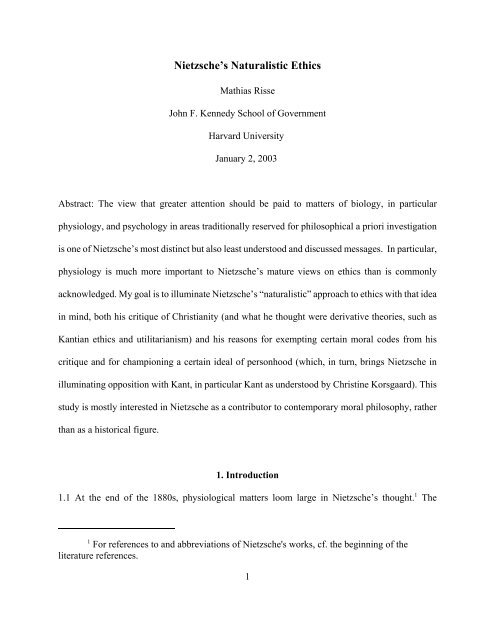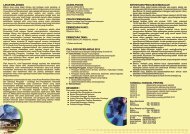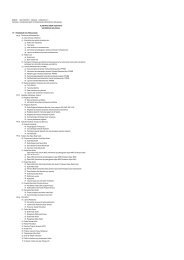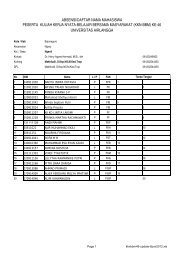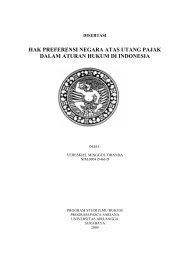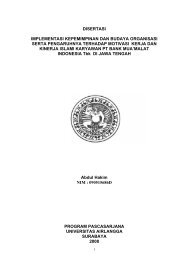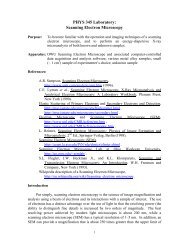Nietzsche's Naturalistic Ethics - UNAIR | E-Book Collection
Nietzsche's Naturalistic Ethics - UNAIR | E-Book Collection
Nietzsche's Naturalistic Ethics - UNAIR | E-Book Collection
You also want an ePaper? Increase the reach of your titles
YUMPU automatically turns print PDFs into web optimized ePapers that Google loves.
Nietzsche’s <strong>Naturalistic</strong> <strong>Ethics</strong>Mathias RisseJohn F. Kennedy School of GovernmentHarvard UniversityJanuary 2, 2003Abstract: The view that greater attention should be paid to matters of biology, in particularphysiology, and psychology in areas traditionally reserved for philosophical a priori investigationis one of Nietzsche’s most distinct but also least understood and discussed messages. In particular,physiology is much more important to Nietzsche’s mature views on ethics than is commonlyacknowledged. My goal is to illuminate Nietzsche’s “naturalistic” approach to ethics with that ideain mind, both his critique of Christianity (and what he thought were derivative theories, such asKantian ethics and utilitarianism) and his reasons for exempting certain moral codes from hiscritique and for championing a certain ideal of personhood (which, in turn, brings Nietzsche inilluminating opposition with Kant, in particular Kant as understood by Christine Korsgaard). Thisstudy is mostly interested in Nietzsche as a contributor to contemporary moral philosophy, ratherthan as a historical figure.1. Introduction1.1 At the end of the 1880s, physiological matters loom large in Nietzsche’s thought. 1 The1 For references to and abbreviations of <strong>Nietzsche's</strong> works, cf. the beginning of theliterature references.1
penultimate section of Ecce Homo (the last merely containing the infamous reference to “Dionysusvs. the Crucified”) captures this concern, insisting that notions such as “soul,” “spirit,” and inparticular “immortal soul” were invented to treat the serious questions of life with carelessness,namely, “questions about nutrition, shelter, mental diet, treatment of the sick, cleanliness, [and]weather.” The section Why I am So Clever abounds in comments on those matters. Similarly, theTwilight praises the Greeks for having started culture at the right place, “not in the ‘soul’ (as wasthe fatal superstition of priests and half-priests): the right place is the body, gesture, diet, physiology,the rest follows” (Skirmishes, 47). And when in the Antichrist Nietzsche sums up against whatChristianity has conspired, he first mentions health (A 62). Such remarks are signposts of the viewthat greater attention should be paid to matters of biology, in particular physiology, and psychologyin areas traditionally reserved for philosophical a priori investigation. That view, I think, is one ofNietzsche’s most distinct but also least understood and discussed messages. In particular,physiology is much more important to Nietzsche’s mature views on ethics than is commonlyacknowledged, notably in existentialist readings and readings championing Nietzsche as philosopherof self-creation. 2My goal is to illuminate Nietzsche’s approach to ethics with that idea in mind, both hiscritique of Christianity (and what he thought were derivative theories, such as Kantian ethics andutilitarianism) and his reasons for exempting certain moral codes from his critique and forchampioning a certain ideal of personhood. Nietzsche’s ethics approached in this way may aptly becalled “naturalistic.” There is no need to discuss the notion of naturalism in general since showing2 Nietzsche, of course, is also the philosopher of self-creation. Nevertheless, his approachto ethics and agency is both naturalistic and fatalistic. In this study, we will neglect the questionof how to combine those two sides of Nietzsche’s work; but cf. Leiter (1998) and Risse (2003).2
what Nietzsche’s ethical naturalism amounts to is the goal of this study. 3 Suffice it for the timebeing to quote two of Nietzsche’s most explicit statements of his naturalism. Both statements speakfor themselves. The first statement is from Beyond Good and Evil:But we hermits and marmots have long persuaded ourselves in the full secrecy of a hermit’s conscience thatthis worthy verbal pomp, too, belongs to the old mendacious pomp, junk, and gold dust of unconscious humanvanity, and that under such flattering colors and make-up as well, the basic text of homo natura must again berecognized. To translate man back into nature; to become master over the many vain and overly enthusiasticinterpretations and connotations that have so far been scrawled and painted over the eternal basic text of homonatura; to see to it that man henceforth stands before man as even today, hardened in the discipline of science,he stands before the rest of nature, with intrepid Oedipus ears, deaf to the siren songs of old metaphysical birdcatchers who have been piping at him all too long, ‘you are more, you are higher, you are of a different origin!’(BGE 230)The second statement is from the Antichrist:We have become more modest in every way. We no longer derive man from “the spirit” or “the deity;” we haveplaced him back among the animals. We consider him the strongest animal because he is the most cunning: hisspirituality is a consequence of this. (...) Man is by no means the crown of creation: every living being standsbeside him on the same level of perfection. And even this is saying too much: relatively speaking, man is themost bungled of all the animals, the sickliest, and not one has strayed more dangerously from its instincts. Butfor all that he is course of the most interesting. (A 14)3 The reader should keep the following definitions in mind (following Darwall (1998),chapter 3). Metaphysical naturalism holds that nothing exists beyond what is open to empiricalstudy and, consequently, that ethical thought and feeling are empirically ascertainable facts aboutthe world. Among the metaphysical naturalists, the ethical naturalist is distinguished by hisbelief that value is an aspect of nature. I regard Nietzsche as an ethical naturalist, and, onceagain, exploring what this amounts to is the goal of this study. For discussions of naturalism, cf.Railton (1990) and Darwall (1998), chapter 3; for a defense of Nietzsche’s naturalism, see Leiter(2002), chapter 1. See also TI, Anti-Nature, 2 and Skirmishes 33; and EH Destiny 7. AsRichardson (1996), p 46 (note 59) notes, Nietzsche’s commitment to naturalism goes at least asfar back as 1872 (“Homer’s Contest”).3
1.2 This study proceeds as follows. The critical part of Nietzsche’s approach is his account ofressentiment-based morals, discussed in section 2. The pivotal notion of Nietzsche’s Genealogy,“ressentiment” is crucial to his critique of morality. Yet the origins of ressentiment withinNietzsche’s philosophical anthropology remain unexplored. In particular, the intimate connectionsbetween Nietzsche’s account of the origins of the mind (which is a physiological account) and hisaccount of ressentiment remain neglected. But we must understand how it can be plausible forressentiment to arise to understand why it could become so important in the history of morality.Otherwise Nietzsche would have no basis to grant such a pivotal role to ressentiment. Section 2attempts to close this lacuna by locating the “actual physiological cause” from which Nietzscheclaims ressentiment arises (GM I, 15). Such an account of the “physiological cause” of ressentimentis a crucial bit of Nietzsche’s naturalistic ethics. 4Once this account of ressentiment is in place, three questions arise. The first is, on preciselywhat grounds does Nietzsche criticize morality? One answer is that he does so on the ground thatit arose out of ressentiment. Another answer is that morality’s origin in ressentiment explains why4 Questions about the origins of ressentiment may seem unmotivated since its occurrencemay not appear puzzling: slaves and priests are oppressed by the masters, and what more isrequired to explain their anger and resentment? However, the development of ressentiment doespose a puzzle. In GM II, Nietzsche develops a sketch of a philosophical anthropology to traceguilt to a set of non-moral origins. Ressentiment is as complex an emotion, and, in view of theelaborate machinery used to explain how the mind comes to harbor guilt, cannot be leftunexplained. Once Nietzsche’s speculative anthropology is in place, we must make sure that hisremarks about ressentiment can be derived from it, or are at least consistent with it. Otherwisethey would remain unsubstantiated. Guided by the emotional lives we experience, we may ormay not find the emergence of ressentiment puzzling. Either way, Nietzsche’s genealogicalinquiry must account for it. For Nietzsche’s project in the Genealogy is precisely to develop the“animal psychology” (GM III, 20) explaining why our emotions are what they are. Explanationsmust end somewhere, but Nietzsche’s would cease too early if he could not ground ressentimentwithin the confines of his speculative anthropology.4
morality is problematic in ways objectionable independently of their origin. For instance, moralitymight be criticized for resting on a flawed picture of agency. While ressentiment may explain howsuch a picture emerged, it would be criticized for its erroneous content. Since it has been addressedat length in the literature, 5 we initially disregard this question. The second question asks whetherNietzsche has reasons to exempt a certain class of moral codes from criticism levied againstressentiment-based moral codes. We explore this question in section 3. My central claim in thatsection is that, contrary to what is commonly thought, Nietzsche does acknowledge such a class ofmoral codes, and especially acknowledges a naturalistic notion of obligation. 6 Thus Nietzsche’srevaluation of values amounts to more than a critique. The third question raises an objection to therelevance of this inquiry. The concern is that morality is essentially a first-person affair. Thusinquiries like Nietzsche’s are beside the point. This objection arises formidably from the point ofview of Kantian ethics and is fruitfully addressed by way of an argumentative engagement betweenNietzsche’s account of the origins of morality and Korsgaard’s (1996a) account of the “sources ofnormativity.” However, since Korsgaard enlists Nietzsche for her purposes, we need a Nietzscheanstance towards her account beyond a response to this objection to ensure the distinctness of hisaccount. Section 4 responds to the objection from the irrelevance of third-person inquiries andoffers such a stance. In the conclusion we revisit the first question and briefly discuss it in light ofinsights from sections 3 and 4. It turns out that the ideal of personhood central to the Nietzscheanstance towards Korsgaard offers part of an answer to that question. My hope is that by that the end5See Leiter (1995) and Leiter (1997) and references therein.6 Cf. e.g.. Darwall (1998), p 32/33: ”Nietzsche believed that a sensible naturalism shouldsimply reject the idea of morality as a vestigial holdover from a Judeo-Christian theologicaltradition that can be given no empirical naturalist basis.” This is false.5
of this study the shape of Nietzsche’s naturalistic ethics has become visible.2. The Origins of Ressentiment2.1 The origins of the mind, for Nietzsche, are also the origins of morality, the crucial link beinga state of mind he calls ressentiment. To approach what is distinct about Nietzsche’s assessment ofmorality, we must discuss his account of ressentiment, and to see what is distinct about ressentiment,we must approach it in the context of Nietzsche’s account of the mind, that is, within hisphilosophical anthropology. Taking Nietzsche’s project seriously as “animal psychology”(GM III,20), this section proposes an account of the physiological core of ressentiment. Such an approachmay seem at odds with recent characterizations of ressentiment, like the one given by Reginster(1997), who argues thatressentiment (...) cuts off the conditions of satisfaction of a desire from the conditions of enjoyment of thatsatisfaction. (....) [T]he ‘man of ressentiment’ is thus left pathetically hanging between the impossibility toenjoy the satisfaction of desires he does not really have, and the impossibility to enjoy the satisfaction of desireshe has, but cannot embrace” (p 305). 7However, such statements pertain to later developments deriving from ressentiment as I characterizeit. My account is supplementary to rather than in conflict with such characterizations.The mind, so we learn in GM II, emerges in response to the oppression of hitherto7 Poellner characterizes it as follows: “Ressentiment is a condition in which an apparentgood is desired by an individual avowedly for its own sake, but in fact in order to ‘negate’ ordenigrate something else which is perceived as hostile or oppressive to that individual” (p 7).Cf. May (1999), p 42/43, who claims that Nietzsche’s ressentiment differs from ordinaryresentment in three ways: “first, its object of hatred is universal in scope (...); second, itthoroughly falsifies that object in order to render the latter inescapably blameworthy (....); third,since such universal resentment is impossible to satisfy, its revenge must be, at least in part,imaginary.”6
unhampered aggressive instincts. The subject of GM II is the development of the bad conscience asa consciousness of guilt. 8 Within his account of the bad conscience, Nietzsche refers to an earlystage of the mind itself as an early form of the bad conscience. Why he would do so is not ourconcern, but this early form, and thus an early form of the mind, originates in people oppressed bythe “pack of blond beasts of prey, a conqueror- and master-race,” which “puts its terrible claws ona perhaps numerically vastly superifor, but formless, still spreading population” (GM II,17). Likein Rousseau’s Discourse on Inequality, individuals initially live without tight communalorganization, following their instincts for food, shelter, sex, and their drives for aggression. Thenmore organized clans start oppressing less organized groups. The oppressed are prevented fromletting their instincts act against others, in particular aggressive instincts for “enmity, cruelty, thelust for pursuit, for raid, for change, for destruction” (GM II,16). Nietzsche calls this inwarddirectionof instincts the internalization of man, regarding it as the origin of mental life beyondrudimentary forms. Prior to the oppression, the “inner world” is merely “thick as extended betweentwo skins,” but as a consequence of the oppression this inner world “has spread and unfolded, hastaken on depth, breadth, height to the same degree that man’s outward discharging has beeninhibited” (GM II, 16). 9 This process is painful and leaves man in the position of an incarceratedanimal “that beats itself raw on the bars of its cage” (GM II, 16). This development also provides8 For discussion, see Clark (1994) and Risse (2001).9 The image of the skins is curious. Clark/Swensen (1998), p 147, suggest that one maythink of something like two layers of an onion. It is important that Nietzsche assumes that therealready is a “small” inner world. For that deprives him of the task to explain how there could beany form of inner life at all, as opposed to explaining how it could be expanded significantly. Itis reasonable to assume that Nietzsche thought that this bit of the development of consciousnesshappened at a pre-social stage. For the development of consciousness under social pressure, cf.also GS 354, and see also BGE 19. For Nietzsche views on consciousness, cf. also Schacht(1983), pp 279-96.7
the foundations for self-consciousness. As Nietzsche puts it, it is only now that a person giveshimself a shape and can envisage “ideal and imaginative events” (GM II,18) as part of a vision.Only when the appropriate kind of inner life exists can individuals think about themselves, andabout themselves in relation to the world around them and others in it.2.2 We are now ready to account for the origins of ressentiment within Nietzsche’s speculativeanthropology. Yet first I must clarify my usage of the terms “ressentiment,” “resentment,” and“anger.” Our usage of terms for emotions is shaped by the process of socialization that has givenrise to them. Since Nietzsche’s concern is to trace the origins of such emotions, terms denotingemotions as we know them are ill-suited for his purposes. One possible rationale for Nietzsche’semploying a French term nevertheless known to educated German-speaking readers of his time isto have a term related to “anger” and “resentment” as we understand them while allowing for thatterm to be explicated by his anthropology, rather than by intuitions shaped by the emotional liveswe experience. In this study, then, the meaning of “ressentiment” is explicated by the account weare about to develop, whereas I use “anger” and “resentment” colloquially. Dictionary definitionswill do for clarification. 1010The New Oxford American Dictionary defines anger as “a strong feeling of annoyance,displeasure, or hostility”, and resentment as “bitter indignation at having been treated unfairly.”For the contemporary understanding of anger and resentment, cf. Solomon (1993). Although“ressentiment” is a French word (and thus missing from the Grimms’ dictionary), the Germaneducated elite had used it since the 17 th century. The word was presumably adopted becauseGerman lacks a good word for the English “resentment” and the French “ressentiment.” (Theword Groll does not characterize a frame of mind or an attitude, but a reaction in response to aspecific event or person.) At the same time, these words serve reasonably well as translations ofeach other, except that the French word seems to possess a connotation with memory that theEnglish word lacks. Cf. de Gruyter’s 1977 Deutsches Fremdwörterbuch. Cf. also the usage inTI, Ancients, 4, where Nietzsche claims that Christianity is guilty of ressentiment against life. Inthis case, “ressentiment” just means “resentment.” Bittner (1994) distinguishes a German word8
A seemingly straightforward way to account for ressentiment is to explain it in terms of theinternalization of oppressed instincts. Anger and resentment (or earlier versions thereof) plausiblyarise when those instincts are “pushed back,” to use an expression that Nietzsche employs whendiscussing the development of guilt (GM II, 21). That is, they arise as emotional counterparts to thepractice of discharging aggressive instincts, just as guilt (as discussed later) arises as the emotionalcounterpart to the practice of ancestral worship once the Christian sittliche Weltordnung is in place. 11However, a satisfactory account of ressentiment will be more involved. For outside the Genealogy,Nietzsche also conducts a recognizable discussion of ressentiment individuals feel towardsthemselves. This ressentiment exists even before the priests assume their roles as direction-changersof ressentiment, persuading the ressentiment-driven “herd” to blame themselves rather than todischarge their ressentiment towards others (cf. GM III, 15). This notion of ressentiment towardsoneself and the character dominated by this sentiment is present in Nietzsche’s writings at least sincethe Second Untimely Meditation, although he does not use the word “ressentiment” prior to theGenealogy. Yet the existence of ressentiment towards oneself is puzzling within Nietzsche’s modelbecause the aggressive instincts were not directed against the individuals themselves either. It is for“ressentiment” from a French world “ressentiment,” which is spelled and pronounced alike andis the source of the former. He suggests that the French word expresses “a more straightforwardannoyance, less of a grudge than the German word does.” I agree with this suggestion, and takeit to be compatible with my suggestion above. Scheler (1955) remarks that he uses the word“ressentiment” because he was unable to translate into German (p 36); he emphasizes inparticular that the word “ressentiment” denotes a repeated re-living and re-feeling of the past.11 Cf. A 26: “What does ‘moral world order’ (sittliche Weltordnung) mean? That there isa will of God, once and for all, as to what man is to do and what he is not to do; that the value ofa people, of an individual, is to be measured according to how much or how little the will of Godis obeyed; that the will of God manifests itself in the destinies of a people, of an individual, asthe ruling factor, that is to say, as punishing and rewarding according to the degree ofobedience.”9
that reason that the notion of ressentiment requires a more complex account than the reference tothe internalization of instinct leading to anger and resentment. 122.3 I submit that ressentiment is a state of mind arising when the mind becomes conscious of itself12I discuss ressentiment towards oneself and its importance for any account ofressentiment at more length in Risse (forthcoming), a companion piece to this essay. However,the claim needs to be supported at least briefly. In support of the claim that there is indeed arecognizable discussion of ressentiment towards oneself , consider section 6 in Ecce Homo’schapter Why I am so Wise. Discussing ressentiment, Nietzsche writes: “One cannot get rid ofanything, one cannot get over anything, one cannot repel anything – everything hurts. Men andthings obtrude too closely; experiences strike one too deeply; memory becomes a festeringwound.” And further down in the same paragraph: “Nothing burns one up faster than the affectsof ressentiment. Anger, pathological vulnerability, impotent lust for revenge, thirst for revenge,poison-mixing in any sense – no reaction could be more disadvantageous for the exhausted.” Itseems that anger, pathological vulnerability and the other sentiments mentioned are reactions ofa person who does not “get rid of anything” or “get over anything.” Here, for instance,ressentiment is not directed towards others, but tied to the inability to come to terms with one’sown past. Individuals who turned out well (die Wohlgeratenen), whom we shall encounter laterin this section, are characterized in particular by their ability to come to terms with their past: Hebelieves neither in ‘misfortune’ nor in ‘guilt’: “he [the person who turned out well] comes toterms with himself, with others; he knows how to forget -- he is strong enough; hence everythingmust turn out for his best” (EH, Wise, 2). The connection between ressentiment and the inabilityto come to terms with one’s past is present already in the Second Untimely Mediation, althoughNietzsche there, of course, does not talk about “ressentiment.” Consider this passage in UM II, 1:A human being who would like to feel historically through and through would resemble the one who wouldbe forced to deprive himself of sleep, or resemble the animal that should live on ruminating and everrepeated ruminating. So: it is possible to live almost without memory, even to live happily, as the animaldemonstrates; yet it is entirely impossible to live without forgetting. Or, to explain myself even simplerabout my topic: there is a degree of sleeplessness, of ruminating, of historical sense, at which the living isharmed, and ultimately perishes, be it a human being or a people or a culture.The character described here bears strong similarities to the character we just encountered inEcce Homo. While the subject of ressentiment towards oneself requires more attention than wecan give it, note that emphasis on this type of ressentiment, although not common in the currentAnglo-American literature on Nietzsche, is far from idiosyncratic; for it has been a major pillarof Heidegger’s reading of Nietzsche; cf. Heidegger (1954) and (1977), and for discussion,Sugarman (1980) and Koecke (1994). Koecke (1994), p 62f distinguishes between ressentimentin the broader sense and ressentiment in the narrower sense; ressentiment in the narrower senseis like the German word Groll and is directed against others, and in the broader sense it isdirected also against onself.10
under circumstances in which deep-rooted, ingrained anger and resentment are already present inthe mind. Anger and resentment (or, again, some evolutionarily earlier versions thereof) arisebecause the evolution of the mind occurs in response to violent oppression of aggressive instincts.Nietzsche’s image of the animal that finds itself incarcerated and bites itself raw on the bars of itscage is helpful here (cf. GM II, 16): where previously instincts could be discharged against otheranimals, anger and resentment now grow. Contrary to Aristotle’s classic account in the Rhetoric(1378a34), this kind of anger is not directed against any specific individual, any more than theaggression of the earlier instincts was directed against anybody in particular. Once the mindbecomes conscious of itself, something new happens: anger and resentment resulting from theoppression of instincts are now directed not only against mental representations of others, butagainst mental representations of the mind itself. For the mind to become conscious of itself meansfor it to become able to refer to and reflect upon itself, perhaps by forming representations of itselfor beliefs, emotions, or other entities ”inside” or constitutive of it, perhaps in other, nonrepresentationalways. But once the mind is capable of making reference to itself, anger andresentment find new targets inside the mind: they become directed against the mind itself. Putdifferently, when the mind expands the scope of entities it can refer to, in this case to entities insideitself or part of it, anger and resentment expand their scopes as well. While any representation in themind provides internal targets for anger and resentment replacing the former external targets ofaggressive instincts now beyond reach, the mind’s becoming self-conscious increases the range ofsuch internal targets by including representations of the mind itself, including memories of itsdevelopment. Since the mind is from the beginning on an angry and resentful mind, anger and11
esentment now spread and start referring to whatever the mind itself is capable of referring. 13My suggestion is to call ressentiment the state of mind that arises in this way. “Anger,pathological vulnerability, impotent lust for revenge, thirst for revenge, poison-mixing in any sense”arise then as expressions, or, “affects” of ressentiment (cf. EH, Wise, 6), and at the same time, thepresence of this state of mind numbs the residual pain that is still present in the mind because of theinternalization (cf. GM III, 15). 14 Nietzsche might say of ressentiment what he actually says of guilt:that it “fixes itself firmly, eats into him, spreads out, and grows like a polyp in every breadth anddepth” (GM II, 21). It is, after all, through ressentiment (as much as through guilt) that “the humansoul became deep” (GM I, 6) – a remark that, within the confines of Nietzsche’s inquiry into theorigins of the mind, has a peculiar literalness to it.13 As I argue in Risse (forthcoming), this account of ressentiment meets three criteria ofadequacy. The first criterion for an account of ressentiment is that it answer the question of whyit should be ressentiment, rather than some other sentiment (resignation, sadness, or apathy) thatthe slaves and priests of the Genealogy have towards the masters. The second criterion is that theaccount can be embedded into Nietzsche’s philosophical anthropology we introduced at thebeginning of this section. The third criterion for our account is that it explain both the ascent ofressentiment towards others and of ressentiment towards oneself. As I explained above,imposing this criterion makes it harder to explain the development of ressentiment, becauseanger and resentment towards others can be explained for the original aggressive instincts. Butthose sentiments do not naturally arise towards the individual herself, at least not in Nietzsche’smodel. If these three criteria are met (as I argue they are), our account can account for whatNietzsche actually says about the phenomenon of ressentiment.14 The reader may have a circularity worry here: after all, anger and resentment weretaken to be the most basic emotions in this context, but now anger also appears as an expressionof ressentiment. However, circularity should not be a problem here, given that we are discussionthe evolution of moral emotions. Revenge was a major topic for Nietzsche – see D 27, 71, 133,138, 202, 205, GS 69, 290; HAH 44, 60, 92, 99, WS 33 (which is the longest discussion ofrevenge in his work), WS 237, 250, 259); BGE 59, 211, 219 TI Socrates, 7; Skirmishes, 34;Ancients, 4. A 20, 40, 62. A phenomenon deriving from (or at least related to) ressentiment notmentioned in GM or EH is vanity – see the astute discussion in BGE 261.12
2.4 On this proposal, the person of ressentiment (i.e., a person whose mind is characterized by thisstate) is left damaged by the process of internalization and socialization in a peculiar way. She isunable to develop an inner life absorbing pain, anger, and resentment that stem from the oppressionof instincts. Her inner life is in unhealthy ways tied up with behavior belonging to the preinternalizationperiod: neither does she live under circumstances in which she can discharge herinstincts, nor has she managed to develop an independent and unified inner life that integrates orabsorbs conflicting instincts and thus eliminates or at least reduces anger and resentment. The personof ressentiment may be unable to come to terms with the influences of his environment and thememories of his past, or be unable to overcome the inner turmoil of instincts and inclinations andrest in himself. Or he may be unable to close himself off sufficiently against such influences to“become whole.” Instead the person of ressentiment lives an excessively retrospective and otherdirectedlife. In a nutshell, the person of ressentiment is maladjusted to civilization: she hasdeveloped the self-conscious mind that accompanied civilization, but she maintained patterns ofbehavior that were healthy only prior to the process of civilization. Not everybody is like that.Illuminating descriptions of individuals whose characters are not dominated by ressentiment appearin Ecce Homo, in the Twilight, and, early on, in the Fourth Untimely Meditation (Richard Wagnerin Bayreuth). Drawing on the Ecce Homo passage, I refer to the character described by way ofcontrast with the person of ressentiment as the person who turned out well -- der Wohlgeratene. InEcce Homo Nietzsche describes himself, whereas in the Twilight he talks about Goethe and in theMeditation about Wagner. We will return to these passages, but for now, our purpose is merely toillustrate the state of mind of ressentiment by way of contrast. The Wagner passage is closest inspirit to Nietzsche’s physiological interests.What is it, fundamentally, that allows us to recognize who has turned out well? That a well-turned-out person13
pleases our senses, that he is carved from woo that is hard, delicate, and at the same time smells good. He hasa taste only for what is good for him; his pleasure, his delight cease where the measure of what is god for himis transgressed. He guesses what remedies avail against what is harmful; he exploits bad accidents to hisadvantage; what does not kill him makes him stronger. Instinctively, he collects from everything he sees, hears,lives through, his sum: he is a principle of selection, he discards much. He is always in his own company,whether he associates with books, human beings, or landscapes: he honors by choosing, by admitting, bytrusting. He reacts slowly to all kinds of stimuli, with that slowness which long caution and deliberate pridehave bred in him: he examines the stimulus that approaches him, he is far from meeting it halfway. He believesneither in “misfortune” nor in “guilt”: he comes to terms with himself, with others; he knows how to forget –he is strong enough; hence everything must turn out for his best. (EH, Wise, 2)Goethe – not a German event, but a European one (....) He bore the strongest instincts within himself: thesensibility, the idolatry of nature, the anti-historic, the idealistic, the unreal and revolutionary (the latter beingmerely a form of the unreal). He sought help from history, natural science, antiquity, and also Spinoza, but,above all, from practical activity (...) What he wanted was totality; he fought the mutual extraneousness ofreason, senses, feeling, and will (preached with the most abhorrent scholasticism by Kant, the antipode ofGoethe); he disciplined himself to wholeness, he created himself. (Skirmishes, 49)The dramatic element in Wagner’s development is quite unmistakable from the moment when his ruling passionbecame aware of itself and took his nature in its charge: from that time on there was an end to fumbling,straying, to the proliferation of secondary shoots, and within the most convoluted courses and often daringtrajectories assumed by his artistic plans there rules a single inner law, a will by which they can be explained.(UM IV, 2)There are two ways of avoiding the state of mind characterized as ressentiment: not to have beenaffected by the inner turmoil caused by the oppression of instincts (like the masters of the firsttreatise of GM), or overcoming the inner turmoil. Either way one succeeds in being “more whole14
human beings” (BGE 257) than the person of ressentiment, but in rather different ways. It is thesecond way that Nietzsche is most interested in, and all three of these passages offer examples ofthat kind of person. 152.5 Thus being tied to socialization, ressentiment arises as part of the conditio humana. Ressentimentexists because human beings are what they are, namely, by nature driven by aggressive instincts,which instincts must be oppressed when individuals start living socially. Nietzsche describes therelated developments of the mind and of ressentiment much like the outbreak of a disease, in thesame sense in which Dostoevski’s ‘man from the underground’ (a literary study of a person ofressentiment) states that “not only too much consciousness but even any consciousness at all is adisease” (Dostoevsky (1993), p 7). Or, to use an image that Nietzsche provides when talking aboutguilt, just as the bad conscience is a disease much as pregnancy is a disease (GM II, 19), so15 For an illuminating and related discussion of Wohlgeratenheit, see also fragment15[39], p 432 of the 87/89 volume. It is of particular interest that Nietzsche praises this type ofperson not only for her ability to refrain from blame (she does not believe in guilt), but also fornot acknowledging anything as a misfortune. Wohlgeratenheit also appears in the Antichrist, inparticular in the final section A 62, where it is listed alongside health, beauty, courage, spirit,benevolence of the soul, and life itself as opponents of Christianity (cf. also A 24, A46, A52, andalso TI, Errors, 2 ). For the connection between Wohlgeratenheit and Nietzsche’s Übermensch,see EH, <strong>Book</strong>s, 1, where Nietzsche says that the latter just is a type of highest Wohlgeratenheit.EH, Destininy, 4, puts a particular spin on Nietzsche’s use of that term: there he points out thathe rejects the type of the Wohlwollenden and the Wohltätigen, which are the more traditionalmoral ideals of the benevolent and the beneficent. The one who turned out well, as far asNietzsche is concerned, is supposed to replace those types. Persons of ressentiment and thosewho turned out well do not constitute disjoint groups; rather, those notions denote somewhatabstract types, in the spirit of BGE 260, where Nietzsche claims that slave morality and mastermorality can occur in the same individual. As Nietzsche says, a “distinguishing feature of the‘higher nature,’ the more spiritual nature,” is “to be (...) a battle ground for these opposites”(GM I, 16). In GM I, 10, Nietzsche explicitly acknowledges that ressentiment may appear in thenoble man, but then it “consummates and exhausts itself in an immediate reaction, and thereforedoes not poison.”15
essentiment is as well. Ressentiment arises because individuals have been damaged through theprocess of socialization. It is a kind of damage that affects most people. Exceptions are bound to berare. 16The contrast to guilt is illuminating. 17 Nietzsche’s account of guilt developed in GM IIcontains three components: To begin with, there is the early form of the bad conscience that isdistinct from guilt but instead is an early form of consciousness, or “the inner world” (GM II, 16),and that we have discussed above. The second element is an indebtedness to ancestors and gods.The origins of this indebtedness lie in debts towards ancestors for their contributions to the tribe,debts that are paid off in terms of sacrifices. In due course, those ancestors transfigure into gods.While this indebtedness initially surfaces in rituals of worship, it is later transformed into somethingmuch more powerful and domineering, namely guilt. Nietzsche characterizes this transformation asa “pushing-back” of the indebtedness into the original form of the bad conscience (GM II, 21),which in turn is brought about by Christianity. So Christianity, notably the ascetic priest, is the thirdcomponent. While the ascetic priest invents the Christian sittliche Weltordnung, the “pushing-back”is a psychological response to its acceptance. Guilt is not a consequence of socialization as such.It arises later than ressentiment in the process of socialization, and as Nietzsche’s example of theHomeric Greeks in GM II, 23 illustrates, it is not inevitable, even on the societal level. Pace Freud,and as opposed to ressentiment, guilt can be overcome. For Nietzsche, it is ressentiment, rather than16 For this argument it does not matter whether somebody was actually present during theperiod of socialization. Since Nietzsche’s theory is meant to be about human nature, the samedamage is bound to arise also in individuals who have always lived in societies (i.e., the vastmajority).17For the account of guilt summarized here, cf. Risse (2001).16
guilt, that is that “the price we pay for our advance in civilization” (Freud (1961), p 97). 183. Morality Naturalized3.1 Ressentiment, then, is a damaged state of the mind that arises through forced internalization ofaggressive instincts accompanying the socialization of recalcitrant individuals accustomed to livingwithout a tight communal structure. Ressentiment brings about the slave revolt in morality that turnsthe world into a “madhouse” (GM II, 22). The mechanics of that revolt do not concern us. Sufficeit to mention that Christianity arises through the struggle between the two types of ressentiment(slaves and priests) and the type of those who turned out well (die Wohlgeratenen – in GM I, themasters), and that other moral theories emerge from Christianity as feeble attempts to reconstructbits of the Christian sittliche Weltordnung without endorsing its argumentative keystone, the notionof God. 19 Section 2, then, identifies a state of mind that gives rise to a class of moral codes Nietzscherejects. Yet on precisely what grounds does he do so, given that he is aware that a thesis about theorigins of X does not entail that X has a certain value (cf. GM II, 18)? We do not address thisquestion systematically because it has already been discussed extensively. Yet there is another andequally important question that arises at this stage, namely, whether Nietzsche’s speculative historyof morality offers an account of moral codes that are not to be rejected. This section shows that hedoes. However, after discussing this matter here and another question in section 4, we return to the18 In chapter VIII of Civilization and Its Discontents, Freud writes that the sense of guiltis “the most important problem in the development of civilization” and that “the price we pay forour advance in civilization is a loss of happiness through the heightening of the sense of guilt”(Freud (1961), p 97). What is not entirely clear is whether the kind of guilt that Nietzschethought can be overcome coincides with what Freud thought was the price we pay forcivilization.19See Risse (2001), section 5.17
question about the substance of Nietzsche’s critique in the conclusion.A set of moral codes exempt from whatever criticism Nietzsche levies against ressentimentbasedmoral codes appears in GM II. These codes constitute what Clark (1994) calls Nietzsche’s“naturalistic social contract.” As Nietzsche points out in GM II, 4, there is an old idea that originatesin the debtor-creditor relationship, namely, that every damage has its equivalent and can be paid offin some way. A debtor unable to pay off his debt must give the creditor something else he owns.This may amount to letting the creditor inflict torture on himself because people enjoy watchingtorture or inflicting pain themselves (GM II, 6). An individual’s relationship with his communityis a debtor-creditor relationship. The community protects him, requiring that he pay back his debtsby respecting its rules. For these debtor-creditor relationships there is a background assumption thatthe individuals involved are roughly equally powerful (GM II, 8). These ideas give rise to a simpleidea of justice: “Everything can be paid off, and everything must be paid off.” So justice forNietzsche does not depend on ressentiment-driven moralities. On the contrary, he holds the just manin highest esteem, dedicating a long section in the Genealogy (GM II, 11) to explaining that the justman is not the man of ressentiment, appearances notwithstanding. This point is important in lightof Foot’s (1994) claim that the relevance of Nietzsche’s “immoralism” lies in his rejection ofjustice. Foot is right if she means a Christian notion of justice, or one derivative thereof, but wrongif she thinks that Nietzsche rejects ideas of justice outside that context. In this discussion in GM II,then, Nietzsche develops a viewpoint from which he can account for codes one may classify asmoral, but without appeal to ressentiment and guilt, or to any super-natural entity. 2020Nietzsche tells us in the Wanderer and his Shadow that virtues such as moderation,justice, and peace of mind would be regained by every free and conscious mind independently ofmorality (WS 212). Elsewhere, Nietzsche emphasizes that one of the flaws of Christianity is thatit destroyed all worldly justice (WS 81). For justice is about acting in proportion and about18
3.2 More needs to be said for this idea of justice to be helpful. What remains unclear is how broada conception of rights and duties (and hence justice) emerges from Nietzsche’s debtor-creditormodel. Several years earlier, in Dawn, Nietzsche provides us with a “natural history of rights andduties,” which illuminates this notion of a naturalistic social contract:Our duties - are the rights of others over us. How have they acquired such rights? By taking us to be capableof contracting and of requiting, by positing us as similar and equal to them, and as a consequence entrustingus with something, educating, reproving, supporting us. We fulfill our duty – that is to say: we justify the ideaof our power on the basis of which all these things were bestowed upon us, we give back in the measure inwhich we have been given to. It is thus our pride that bids us do our duty – when we do something for othersin return for something they have done for us, what we are doing is restoring our self-regard – for in doingsomething for us, these others have impinged upon our sphere of power, and would have continued to have ahand in it if we did not with the performance of our “duty” practice a requital, that is to say, impinge on theirpower.-- My rights – that are part of my power which others have not merely conceded me, but which they wishme to preserve. How do these others arrive at that? First: through their prudence and fear and caution: whetherin that they expect something similar from us in return (...); or in that they consider that a struggle with uswould be perilous or to no purpose. Or in that they see in any diminution of our force a disadvantage tothemselves, since we would then be unsuited to forming an alliance with them in opposition to a hostile thirdpower. Then: by donation and cession. In this case, others have enough and more than enough power to be ableto dispose of some of it, and to guarantee to him they have given it to the portion of it they have given: in doingso they presuppose a feeble sense of power in him who lets himself be thus donated to. That is how rightsoriginate: recognized and guaranteed degrees of power. (D 112)This discussion is helpful for exploring the account of justice in the Genealogy. In what follows, wewill merely discuss the notion of duty. Parallel considerations apply to rights. On a narrow readingmeasuring things against each other. Christianity, Nietzsche tells us in HAH 114, lacks preciselythat: measure and proportion. Nietzsche also champions justice in the Second UntimelyMeditation, contrasting it with objectivity.19
of those social contracts in the Genealogy, Nietzsche advocates merely that contracts must befulfilled, the paradigmatic example being a loan to be repaid. Fulfilling a contract means making thedebtor whole again by paying back debts. On a somewhat broader reading, Nietzsche advocates theprinciple of pacta sunt servanda: a word given must be a kept, a contract made must be fulfilled,where contracts are conceived more broadly than by way of exchanging material objects. YetNietzsche’s discussion in Dawn suggests that we can understand the Genealogy’s conception ofjustice even more broadly. According to this reading of the debtor-creditor model, individualinteraction involves interference in each other’s “spheres of power:” whenever somebody doessomething for us, gives something to us, or helps us out, she interferes in our sphere of power andexpands her own. The only way of undoing this interference and thus to make us whole again is byinterfering with her sphere of power and undo the imbalance thus achieved. We must return whatwe have received, or something of equivalent value. To give to each what she is owed amounts torestoring one’s sphere of power. The simplest case remains the case of a loan, but contracting,promising, doing of favors, etc. counts on this reading of the debtor-creditor relationship. Anindividual’s motivation for fulfilling the duty is her pride affected by the interference with her sphereof power.3.3 We discuss this broader understanding of what we owe to each other in 3.4. But first I argue thatNietzsche needs this broader reading to answer a question that arises when he discusses thecharacters he praises. “Immoralists,” so we learn, are not just persons of duty, but cannot escapefrom their duties (BGE 226). The masters also acknowledge duties, but only towards each otherwhile despising universal duties (BGE 260 ff; especially BGE 265). To the extent that they help theless fortunate, they do so out of strength, not out of pity. In BGE 272 Nietzsche says that it is a sign20
of nobility to count one’s privileges and their exercise among one’s duties. 21 So Nietzsche thinks thecharacters he hopes will overcome morality as we know it are bound by duties. Whatever thosecharacters are, they are not simply amoral creatures. 22Yet one wonders in what sense those duties are binding, and thus, in what sense they areduties in the first place. On the Christian sittliche Weltordnung, duties rest on the relationshipbetween human beings and their divine creator. In Kantian ethics duties are based on what reasondemands. Nietzsche rejects such traditional accounts of duties, but insists that his preferredcharacters are persons of duty. Does Nietzsche commit the blunder he ascribes to Kant and theutilitarians, namely, to endorse bits of traditional morality without endorsing keystone elementsneeded for its justification? To respond Nietzsche must justify duties without making nonsense ofhis criticism of traditional morality. The naturalistic codes provide an obvious answer, and no otheranswer emerges from Nietzsche’s writings. Yet the narrow reading of the debtor-creditor relationswill not do. The duties Nietzsche envisages for the types he praises are presumably morecomprehensive than merely obligations to return what one has loaned, or to stick to one’s contracts.Thus the duties individuals have towards each other are to be understood in terms of the urge to21 Cf. also EH, Skirmishes, 38, and the 1886 preface to HAH. Consider, in this context,also Nietzsche’s insistence that he is the first decent person resisting the falseness and hypocrisyof centuries (EH, Destiny 1; see also TI, Skirmishes, 37). These considerations may also explainthe curious remark in TI, Maxims, 36: “Whether we immoralists are harming virtue? Just as littleas anarchists harm princes. Only since the latter are shot at do they again sit securely on theirthrones. Moral: morality must be shot at.” This seems to say that Nietzsche understands his owncriticism as a way of strengthening the Christian sittliche Weltordnung. However, this hardlymakes sense in the larger context of TI. Instead, what it might mean is that the proper kind ofmoral codes can be identified thorough critique, that is, moral codes that are not only consistentwith but restore Anstand, decency, just as attacks on princes make it possible for them to restore“true” power that they had begun to share in a constitutional manner.22For Nietzsche on the morality of the higher men, cf. also Schacht (1983), pp 463-69.21
maintain their respective spheres of power. Yet this move confronts us with the full force of thechallenge to make sense of that ideal of justice. Unless he offers resources to explicate duties interms of the restoration of spheres of power, this talk is at best idle and at worst implicates him inthe same error of which he accuses Kantian and utilitarian ethics.3.4 Our goal, then, is to elucidate Nietzsche’s talk about “spheres of power” to make sense of histalk about duties. To this end, it is useful to appeal to what Leiter (1998) calls Nietzsche’s “Doctrineof Types,” according to which each individual has a fixed psycho-physical constitution defining himas a type of person. Facts about one’s type explain one’s beliefs and values. As Nietzsche says,“Moralities are the sign languages of affects” (BGE 187), or earlier, in D 119, “our moraljudgements and evaluations (....) are only images and fantasies based on a physiological processunknown to us.” Since there is a richness of such types, any universal “Thou Shalt” is misguided(TI, Morality as Anti-Nature, 6). Morality and religion tend to disregard this superveniencerelationshipbetween type-facts and facts about beliefs and values. For that reason, Nietzsche refersto them as the realm of imaginary causes and imaginary effects (A 15).With this doctrine in place, we can approach the notion of power. An individual’s power ishis ability to create optimal circumstances for his psycho-physical constitution (or his growth inactivity, as Richardson (1996), p 21, puts it, where the relevant activity is the activity characteristicof an individual’s type). As Nietzsche tells us in GM III, 7,[e]very animal (..) instinctively strives for an optimum of favorable conditions in which fully to release hispower and achieve his maximum feeling of power; every animal abhors equally instinctively, with an acutesense of small “higher than all reason,” any kind of disturbance and hindrance which blocks or could block hispath to the optimum.22
This, in turn, delivers two explications of “spheres of power” and thus of duties. A sphere of poweris either a person’s range of activities under such optimal conditions, or, alternatively, a person’srange of activities under constraints (“normal conditions”). Nothing depends on which explicationwe choose. A person’s pride is offended, or at least challenged, when her sphere of power isaffected, if only by somebody’s doing her a favor. This takes us to Nietzsche’s approach to duties.Nietzsche understands duties in terms of the urge to restore one’s sphere of power once affected.(Again, I omit a discussion of rights, but the same resources apply there as well.) Recall thatNietzsche states that moralities are sign languages of affects (BGE 187). This discussion aboutduties is a paradigmatic example of how Nietzsche may illuminate that idea and how his accountprovides a naturalistic explication of duties. What his account of duties explains is, as it suits anaturalistic account of duties, the behavior that we associate with the execution of duties. It does soin terms of an urge and thus in physiological terms. Needless to say, this account triggers the samequestion that arise for any ethical naturalism, namely, whether such an account provides asufficiently strong account of normativity. This question, however, goes beyond the scope of thisstudy. 2323 For discussion, see Darwall (1998), chapter 3. Nietzsche does not claim that there issome otherwise unexplained duty to preserve the spheres of power. He does not appeal to anirreducible normative force of a certain set of facts. In particular, his account of duties (and ourexplication thereof) does not, in order to find a foundation for duties, appeal to the “long ladderof rank order and value differences” (BGE 257) discussed in chapter IX of Beyond Good andEvil. If Nietzsche tried to account for duties in this way, he would open himself up to a host ofproblems arising from stipulating normativity where a naturalist like Nietzsche needs to do someexplaining. Crucially, Nietzsche appeals to an individual’s pride at the point where any suchunexplained notion of normativity could come in; that is, pride that is affected if his sphere ofpower is infringed upon. Such an appeal to pride is plausible given Nietzsche’s general outlookthat each individual aims at optimal conditions: pride is the feeling that arises from havingaccomplished this, and one’s pride is affected if one fails to accomplish it. So Nietzsche’saccount is not in a rather straightforward way question-begging.23
intelligibility of the view of an agent’s “making up his mind:” of her going through a process leadingto a decision, which process is the subject of moral reasoning. The objection must be raised fromwithin a theoretical framework, since if asked in isolation, it cannot lead to more than definitionprobing. The obvious choice of a framework is Kant’s, and its most useful development for ourpurposes is Korsgaard (1996a), who emphasizes the centrality of the first-person point of viewthroughout. Yet this section is concerned with Korsgaard’s Kant not merely to address the objectionfrom the irrelevance of third-person inquiries, but also because Korsgaaard’s (1996a) account isintertwined with Nietzsche’s in ways that require clarification to ensure the latter’s independenceand distinctness. For Nietzsche, Kantian ethics is a feeble attempt to reconstruct fragments of theChristian sittliche Weltordnung without endorsing its argumentative keystone, the notion of God.Yet Korsgaard, classifying her account as naturalistic, appeals to Nietzsche by suggesting that hisway of tying the development of the mind to morality speaks in her support. On Korsgaard’s view,then, Nietzsche may appear as a philosopher who succeeded as far as he agrees with Kant, butotherwise at best demonstrates how events that are human-all-too-human can be obstacles on thepath to the Kingdom of Ends. Thus we require a Nietzschean stance on Korsgaard’s argumentbeyond the need for addressing the objection from the irrelevance of third-person inquiries. Thissection pursues both these purposes: addressing the objection, and clarifying the relationshipbetween Nietzsche and Korsgaard’s Kant more generally. 2424 Korsgaard’s appeal to Nietzsche should not be taken to imply more than she says,namely, that Nietzsche’s views are “harmonious” with hers as far as they go (p 158). Yet there isa genuine challenge arising from the similarities between the two accounts; the need for thisNietzschean stance arises from the nature of the theories, rather than by what Korsgaard actuallysays about their relationship. In light of the sheer volume of Kant scholarship, much of what wecan say is sketchy. Also, in this study, we are not concerned with questions of Kant scholarship.We take Korsgaard’s reading of Kant’s Groundwork for granted.25
4.2 Let me introduce some core elements of Korsgaard’s (1996a) account. Once the account is inplace, we will see how the objection from the irrelevance of third-person inquiries to morality arises;we will also see more clearly how the two accounts are related. Korsgaard wishes to show howobligation is grounded in the reflectiveness of self-consciousness, and in virtue of this connectionshe regards her account as naturalistic. The guiding idea is that the capacity to value rests on thereflective nature of the mind: what the mind can and must value, and thus what it is morallypermitted, forbidden, or obligated to do, is constrained thereby. To begin with, it is in virtue ofbeing reflective that a human being can and must view her desires and impulses from a position ofdeliberative detachment. Put differently, in virtue of being reflective, a human being is the kind ofcreature that can and must act for reasons. To be able to make choices and thus to act for reasonspresupposes some conception under which the agent values himself and finds his life worth living.Otherwise he would be in the position of Buridan’s famous ass: he would not know how to chooseto act on some desire rather than any other. This conception is what Korsgaard calls the agent’spractical identity. While reasons express an agent’s identity, obligation stems from what isinconsistent with it. For a practical identity to pertain to a unified decision-maker operating over arange of phenomena, there must be a principle governing her choices to guarantee that similarchoices are made under similar circumstances. Otherwise, the agent’s choices would be a set ofdisconnected phenomena. Thus the reflective nature of the agent’s consciousness forces her choicesto be governed by a law. So far we have said nothing about other agents. To make the connection,note that what these considerations, properly expanded, aim to show is that agents have a practicalidentity only in virtue of being animals capable of reflection, which in turn is what makes themhuman. Our humanity, then, is the source of our ability to bestow value on anything. Thus we mustvalue our humanity if we are to value anything. But since we must value our humanity, we must not26
only value it in ourselves, but in others as well. This entails that no rational being should ever beused merely as a means, and not as an end. For otherwise, a rational agent could be used merely asa means to something that has value only because rational agency confers it. This is a practicalperversity at best, and possibly a kind of contradiction. Moral agency, on the Kantian view, isshaped by consistency considerations. 25This account is developed from a first-person point of view, answering the question “Whatought I to do?” by advising the agent to make up her mind while respecting constraints imposed byher rational nature. Any approach to morality not developed from the first person point of view failsto answer that question and is thus deficient from the standpoint of Kantian morality. We can seenow also how this account is intertwined with Nietzsche’s. In both accounts, the emergence ofmorality is tied not merely to the development of the mind, but to the emergence of selfconsciousness.That is why Korsgaard appeals to Nietzsche. 26 Yet while on the Kantian picturereflectivity appears as an activity of the mind constrained in virtue of its rationality, the emergenceof self-consciousness figures in Nietzsche’s account only by way of expanding the range of targetsof anger and resentment. Self-consciousness plays a passive role for Nietzsche. Also, the firstperson has a different standing for Korsgaard’s Kant than for Nietzsche. Being the starting pointfor Kantian morality, the ideal of unity of agency, at least as a regulative ideal, applies to eachrational being. We have not yet said enough to state Nietzsche’s ideal of unity, but it should be clearthat it must be an a-moral ideal, an ideal “beyond good and evil” unavailable to most individual.25 This is the Formula of Humanity version of the Categorical Imperative; see Korsgaard(1996b), chapter 4, and also Wood (1999), chapter 4. Many details remain to be filled in, but thesubsequent discussion does not turn on such details.26 Korsgaard (1996a) suggests that Nietzsche’s views (and Freud’s) are “harmonious”with hers (p 158).27
4.3 Let us develop a Nietzschean response to this Kantian picture, mindful that our goal is to respondto the objection from the irrelevance of third-person inquiries and to devise a more generalNietzschean stance viz-a-viz Korsgaard’s Kant. According to such a response, the Kantian pictureis erroneous in two ways: First, it endorses a wrong view of the mind by including the idea of aninner chooser, reason, that decides which desires are to be incorporated into maxims and thus to acton. It is illusionary to think that the mind can consider desires from a standpoint of deliberativedetachment. Second, even if the Kantian picture of the mind is granted, there is a flaw in thederivation of the commandment that one should act in such a way that no rational being is usedmerely as a means. The first move is thoroughly Nietzschean, whereas the second draws onphilosophical folklore surrounding the Categorical Imperative, which, however, can be easilyintegrated into the Nietzschean framework. The first error, then, is this. The Kantian concern thatNietzsche’s account ignores the first-person perspective rests on a flawed view of the mind and thusof agency. 27 A description of how Nietzsche views the functioning of the mind is given in GS 333:Since only the last scenes of reconciliation and the final accounting at the end of this long process rise to ourconsciousness, we suppose that intelligere must be something conciliatory, just, and good – something thatstands essentially opposed to the instincts, while it is actually nothing but a certain behavior of the instinctstoward on another. For the longest time, conscious thought was considered thought itself. Only now does thetruth dawn on us that by far the greats part of our spirit’s activity remains unconscious and unfelt. (...) Consciousthinking, especially that of the philosopher, is the least vigorous and therefore also the relatively mildest andcalmest form of thinking; and thus precisely philosophers are most apt to be led astray about the nature ofknowledge.As Thiele (1990) says, the “Platonic opposition between reason and passion is fractured into the27 Cf. Parkes (1994), Thiele 1990, pp 51 ff, and Richardson (1996), chapter 1.4, for thedrive constitution of the human mind to be discussed in this paragraph.28
opposition between multiple passions, each with its own capacity for reason and will to dominate”(p 256). What is characteristic of a human mind is not the possession of reason, but instead, “bywhat rank order the innermost drives of his nature are related to each other” (BGE 6), or, as Nietzscheputs it in Dawn, “the totality of drives which constitute [a person’s] essence.” Thus what ischaracteristic of human beings varies across persons. For that reason Nietzsche demands a typologyof morality, rather than an investigation of “foundations” for morality that are unavailable at any rate.What is more, a person’s inner life fails to include an entity reviewing desires and deciding whichones to endorse as reasons. Instead, Nietzsche talks about the soul as a “societal structure(Gesellschaftsbau) of many drives and affects” (BGE 12, cf. BGE 19). This Gesellschaftsbau lacksthe integration and harmony presupposed by the Kantian picture. If some desire is disregarded foranother desire to be adopted into a maxim, the relevant process fails to be reason-based choosing.Instead, “[t]he will to overcome an emotion is ultimately only the will of another emotion or ofseveral others” (BGE 79). The mind is also largely unknown to the agent, which undermines theplausibility of the Kantian model ever more. The mind is the “unknown world of the subject” (whichis the title of D 116), and filled with “phantoms and will-o’-the-wisps” (TI, Errors, 3).Nietzsche’s conception of the functioning of the mind is illustrated by the comments onWagner in the Fourth Untimely Meditation quoted above. Wagner at no point endorsed a conceptionof his life and started following it. Instead, a certain drive became dominant, forcing unity on hispersonality. Where other philosophers are concerned with questions of practical reasoning, Nietzscheaddresses methods of affecting the strength of a drive. These methods amount to making decisionsby shaping and directing drives by indirect means (cf. D 109). In sum, the complex structure of themind brings it about that decision are made in ways different from deliberative detachment.Christianity and Kantian ethics oversimplify the nature of the mind (cf. also BGE 291). As29
Richardson (1996), p 47, puts it: “[A] person is formed of a vast network of power balances, struckat a hierarchy of levels.” In light of the account of the mind in section 2, none of this is surprising.The mind, after all, derives from the oppression of instincts (see GM II, 16). 284.4 This first objection to Korsgaard’s Kant answers the objection from the irrelevance of thirdpersoninquiries. Far from its being the case that third-person inquiries are irrelevant, first-personinquiries are based on a chimeric understanding of the mind. In light of Nietzsche’s theory of themind, there is no intelligible notion of a decision maker whose deliberations are shaped by theconsideration at the center of Kantian ethics. The point is not that agents experience difficultiesapplying such considerations, but that the view of agency is misguided. There is no first-person pointof view as required by Kantian moral theory. This gives plausibility to Nietzsche’s claim that, ratherthan questions for foundations of morality, we need a typology of different characters whose typefactsproduce different Gütertafeln, tables of value (cf. BGE 186; see also BGE 268). While this firstobjection rebuts the objection from the irrelevance of third-person inquiries, there is more to the28 These remarks touch on large issues we cannot discuss satisfactorily. In particular wecannot explore arguments to help us decide between those pictures of the mind. We addressmerely one Kantian response. This response is that, leaving disagreements about the nature ofthe mind to the side, the Kantian account can draw on the phenomenology of decision-making:whatever is going on in the mind on some physiological level, the agent perceives herself asengaged in deliberation and as making choices. The point of view of deliberative attachment ispart of our life experience, part of the world we inhabit as agents. There is a twofold Nietzscheanrejoinder to this: For one thing, it is dubious that the phenomenology of decision making reflectsanything like the Kantian view. The experience of being torn and inconsistent in one’sinclinations is at least as real as the experience of choosing which desires to act on. Perhaps webelieve in the idea of the “inner chooser” merely because it has been part of our upbringing forso long. But for another thing, the Nietzschean might grant this response and point out thatguidance for how to live should draw on a correct picture of the mind and of what it is to be ahuman being, and perhaps the best way of giving such advice is not to give advice on how todeliberate, but on what sets of circumstances to expose oneself to. If our minds deceive us aboutwho we are, recommendations for how to live should take that into account.30
general Nietzschean stance towards Korsgaard’s Kant than the rejection of that objection. Anilluminating way of further developing this stance is to focus on Nietzsche and Kant’s respectiveideals of unity of agency. Once that stance is in place, it emerges that no useful appeal to Nietzschecan be made in support of Korsgaard’s Kant, and does so while showing that Nietzsche is not onlyan astute critic of traditional moral theory, but also accompanies his critiques with substantivepositive insights. To facilitate the sketch of this Nietzschean stance (a stance viz-a-viz a more visibleopponent), I introduce a second objection to the Kantian view.This second objection proceeds as follows. Even if the Kantian picture of the mind is notmisguided, the derivation of the Categorical Imperative is. Thus the Kantian picture fails on its ownterms. The objection is that Kant’s argument fails to show that a rational agent must see his actionsas constrained by her owing equal consideration to every other rational being. It fails to show thatan agent must respect humanity in every agent as much as in herself and can never use any agentmerely as a means. While drawing on the folklore surrounding the Categorical Imperative, thisargument dovetails with Nietzsche’s concerns about universal commands (cf., e.g., (TI, Anti-Nature,6). The problem arises towards the end of the argument in 4.1, in the part that tries to demonstratethat no rational being should ever be used merely as a means. Neither a perversity nor a contradictionarises, contrary to what the argument claims, if I am using you as a means to ends that have valuebecause I have conferred it upon them. Sure enough, because I have given them value I must thinkof myself as having value. This is true for you as well, mutatis mutandis. Yet what this does not showis how my acknowledgment of the fact that you confer value constrains how I relate to you. Theargument demonstrates how you become intelligible to me as an agent, how I come to see youractions as more than mere events, namely by coming to realize that, in a fundamental way, we arealike. While our shared humanity creates enough community between us to make us intelligible to31
each other, this also exhausts the community thus created. The argument fails to show (or renderplausible) that, for any range of phenomena on which I make decisions, I should give you as muchconsideration as I give myself. It does not entail that I should always treat you as an end. Theconfusion in the Kantian argument is to take mutual intelligibility to establish a requirement to giveequal consideration to each other, or to take mutual recognition of intelligibility as entailing such arequirement.4.5 With both objections in place, we can develop a Nietzschean stance viz-a-viz Korsgaard’s Kant.I do so in terms of Nietzsche’s ideal of unity of agency in opposition to Kant’s. On account of thevisibility the Kantian ideal has gained following Korsgaard (1996a), we developed objections toKorsgaard at length to motivate the need for a different ideal of unity. So let us explore first how ourtwo objections speak to Kant’s ideal. As far as Nietzsche is concerned, Korsgaard’s Kant advocatesa misguided ideal of unity of agency. Such unity, on the Kantian view, draws on deliberative closure:the agent is a coherent deliberator whose deliberations are shaped by constraints imposed by herrationality. Yet this ideal is plausible only as long as the Kantian picture of agency is. For accordingto that picture, the core of agency is the act of choosing which desires to incorporate into maxims,and that act of choosing, qua being a rational activity, can be subject to deliberative constraints ofthe sort the Kantian imposes. However, if the mind does not reach decisions in this manner, as thefirst objection urges, unity of agency as deliberative coherence becomes obsolete. To add insult toinjury, the second objection urges that the ideal of unity is also internally flawed by endorsing amisguided notion of coherence. The Nietzschean approach replaces the Kantian ideal with an ideal32
of physiological and mental Wohlgeratenheit – well-turned-out-ness. 29 The unified agent, on thisaccount, is physiologically and mentally balanced, stable, and well-rounded, like Goethe andNietzsche in the passages quoted in section 2. Unity of agency is captured in terms of health andsanity. Wohlgeratenheit is the opposing notion to the character shaped by guilt and ressentiment: theperson who turned out well is not at odds with the world in the manner of that character, but succeedsin resting in himself and finding strength in himself. Nietzsche’s ideal of unity of agency takesseriously his account of the mind developed in section 2. An ideal of unity of agency as deliberativecoherence is, for Nietzsche, “too superficial” by taking seriously only the conscious and thus arelatively unimportant level of the mind, and even that in an unsatisfactory way.One reason why the person of Wohlgeratenheit succeeds in obtaining peace of mind isbecause he is a fatalist: not a fatalist whom this doctrine commits to inactivity, but one who endorsesa “joyous and trusting fatalism,” for which Goethe is praised later in the passage quoted in section2 from TI, Skirmishes, 49. Goethe, who was not only creative, but created himself drawing on asplendid range of sources, who was a healthy, well-rounded, stable and strong personality capableof resting in himself, is also applauded for his ability to find strength through comprehending andappreciating his place within the causal web of the universe that relieves him of any thoughts ofresponsibility, blame, and guilt. 30 To the extent that Nietzsche’s ideal of unity is fatalistic, it is aimed29 Thiele (1990), p 61 also discusses why consistency is not a virtue for Nietzsche.30 Nietzsche uses the term “fatalist” in a sense different from the fatalism of Greekmythology, where some event of the future is fixed and will come true, no matter what one does(but one has perfect freedom to try to change this: it is just bound to fail). Nietzsche’s fatalism isequivalent to determinism. I have argued elsewhere for the connection between well-turned-outnessand fatalism, and also explicated Nietzsche’s fatalism more carefully (Risse (2003); see alsoLeiter (1998)), so I restrict myself to suggesting that being a fatalist helps the person ofWohlgeratenheit to be free at least from guilt. Just like Homeric Greeks in GM II, 23 blame thegods, those agents blame the world.33
at terminating what he deplores as “the juxtaposition of ‘man and world’”, that is, an attitude “ofman as a ‘world-negating’ principle, of man as the measure of the value of things, as judge of theworld who in the end places existence itself upon his scales and finds it wanting” (GS 346). ThusNietzsche’s ideal of unity is subtle: On the one hand, the unified agent rests in himself and is selfcontainedin ways in which the person of guilt and ressentiment is not. On the other hand, the personwho turned out well also conceives of herself as embedded into a causal web comprising the wholeuniverse (cf. TI, Errors, 8). Characteristically for Nietzsche’s ideal, this second feature operates insupport of the first: the person who turned out well, der Wohlgeratene, can safely rest in himselfbecause he is conscious of being part of a causal web that allows for no feelings of guilt and blame.5. Conclusion: Higher Men and Nietzsche’s <strong>Naturalistic</strong> <strong>Ethics</strong>Any attempt to develop Nietzsche’s ideal of agency in more depth would involves us in more detailthan we can accommodate in Nietzsche’s discussion of the “higher men,” the characters he hopes willovercome ressentiment-based moralities. But, by way of concluding, it is now time to resume thefirst question we asked about Nietzsche’s account of ressentiment in section 3, namely, the questionof precisely on what grounds Nietzsche criticizes ressentiment-based morals. We saw at the end ofsection 3 that it is not open to Nietzsche to introduce a criterion of acceptability of moral codes thatdeems acceptable those that are “natural” in some sense while rejecting the others. Yet that left uswith the question of what this criterion of acceptability is that is needed to complete Nietzsche’s case.Section 4 suggested an answer, namely, that ressentiment-based morals are rejected because theyprevent the emergence of a culture dominated by people who turned out well. Indeed, Nietzsche isconcerned that ressentiment based moralities force the world to remain a madhouse, that is hasbecome too strong for the few to whom his ideal of agency is open to flourish. The point is expressed34
well in the preface to the Genealogy:What if a symptom of regression lurked in the “good,” likewise a danger, a seduction, a poison, a narcotic,through which the present lived at the expense of the future? Perhaps more comfortably, less dangerously, butat the same time in a meaner style, more basely? – So that morality itself were to blame if the highest power andsplendor possible to the type of man was never in fact attained? So that morality itself was the danger ofdangers? (GM, Preface 6)Nietzsche’s ideal of ideal of unit of agency, then, at least partially answers the question of whyNietzsche rejects ressentiment-based moralities and exempts the moral codes discussed in section 3from criticism. 31 Obviously, there are reasons to reject or modify Nietzsche’s ideal of agency, inparticular on the basis that the ideal is not meant and unlikely to be met by more than a few. To theextent that we have reason to reject that ideal of personhood, and to the extent that this ideal is crucialto answering the question of what is wrong with ressentiment-based theories without also ruling outthe moral codes we discussed in section 3, we have reason not to worry about leading lives shapedby ressentiment-based theories. But to the extent that we do endorse Nietzsche’s ideal of agency, weshould worry about leading such lives.LiteratureWorks of Nietzsche are from the Kritische Studienausgabe, edited by Giorgio Colli and MazzinoMontinari, dtv/de Gruyter, second edition 1988. I use the usual abbreviations for the works in Englishtranslation, that is, GM for On the Genealogy of Morality, TI of Twilight of Idols, D for Dawn, HAHfor Human All Too Human, WS for The Wanderer and his Shadow (part of Human, All too Humantherein.31 There is, of course, a lot more to this matter; cf. Leiter (1997) and literature references35
II) GS for Gay Science, A for Antichrist, EH for Ecce Homo, Z for Zarathustra, UM for UntimelyMeditations, and BGE for Beyond Good and Evil. I use in general the translations by WalterKaufmann (of Kaufmann and R. J. Hollingdale, for UM, A, TI, and D), except for GM, where I useClark/Swensen; however, I have modified the translations at various points and do not in generaldocument precisely where.Bittner, R. 1994. “Ressentiment.” In Schacht (1994)Clark, M. 1994. “Nietzsche’s Immoralism and the Concept of Morality.” In Schacht (1994)Clark, M, and A. Swensen (eds). 1998. Nietzsche’s On the Genealogy of Morality. Cambridge:HackettDarwall, S. 1998. Philosophical <strong>Ethics</strong>. Oxford: WestviewDostoevsky, F. 1993. Notes from the Underground. New York: Vintage <strong>Book</strong>sFreud, S. 1961. Civilization and Its Discontents. New York: NortonFoot, P. 1994. “Nietzsche’s Immoralism.” In Schacht (1994)Heidegger, M. 1954. What is Thinking? New York: Harper and RowHeidegger, M. 1977. “Who is Nietzsche’s Zarathustra?” In: D. Allison (ed.), The New Nietzsche. NewYork: Delta <strong>Book</strong>Koecke, C. 1994. Zeit des Ressentiments, Zeit der Erlösung. Berlin: de GruyterKorsgaard, C. 1996a. The Sources of Normativity: Cambridge: Cambridge University PressKorsgaard, C. 1996b. Creating the Kingdom of Ends. Cambridge: Cambridge University PressLeiter, B. 1995. “Morality in the Pejorative Sense: On the Logic of Nietzsche’s Critique of Morality.”British Journal for the History of Philosophy 3, 113-145Leiter, B. 1997. “Nietzsche and the Morality Critics.” <strong>Ethics</strong> 107: 250-8536
Leiter, B. 1998. “The Paradox of Fatalism and Self-Creation.” In C. Janaway (ed.), Willing andNothingness: Schopenhauer as Nietzsche’s Educator. Oxford: Oxford University PressLeiter, B. 2002. Nietzsche on Morality. New York: RoutledgeMay, K. 1999. Nietzsche’s <strong>Ethics</strong> and His War on Morality. Oxford: ClarendonParkes, G. 1994. Composing the Soul: Reaches of Nietzsche’s Psychology. Chicago: University ofChicago PressPoellner, P. 1995. Nietzsche and Metaphysics. Oxford ClarendonRailton, P. 1990. “Naturalism and Prescriptivity.” in E. F. Paul and F. Miller Jr. (eds.), Foundationsof Moral and Political Philosophy. Oxford: BlackwellReginster, B. 1997. “Nietzsche on Ressentiment and Valuation.” Philosophy and PhenomenologicalResearch. Vol LVII: 281-305Richardson, J. 1996. Nietzsche’s System. Oxford: Oxford University PressRisse, M. 2001. “The Second Treatise in On the Genealogy of Morality: Nietzsche on the Origin ofthe Bad Conscience.” European Journal of Philosophy 9: 55-81Risse, M. 2003. “Nietzsche’s ‘Joyous and Trusting Fatalism.’” Forthcoming in International Studiesin PhilosophyRisse, M. (forthcoming). “Origins of Ressentiment and Sources of Normativity.”Schacht, R. 1983. Nietzsche. New York: RoutledgeSchacht, R. (ed.). 1994. Nietzsche, Genealogy, Morality. Berkeley: University of California PressScheler, M. 1955. Das Ressentiment im Aufbau der Moralen. In: Scheler, Vom Umsturz der Werte.Bern: FranckeSolomon, R. 1993. The Passions. Emotions and the Meaning of Life. Indianapolis: HackettSugarman, R. 1980. Rancor Against Time. The Phenomenology of ‘Ressentiment.’ Hamburg: Meiner37
Thiele, L. 1990. Friedrich Nietzsche and the Politics of the Soul: A Study of Heroic Individualism.Princeton: Princeton University PressWood, A. 1999. Kant’s Ethical Thought. Cambridge: Cambridge University Press38


